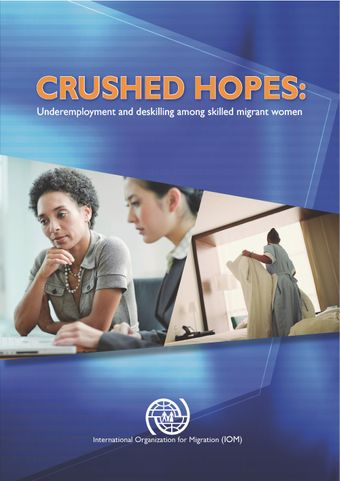- Home
- Books
- Crushed Hopes
- Chapter
The psychosocial impact of underemployment in the lives of skilled migrant women working in Geneva, Switzerland: An empirical study

- Authors: Luisa Marin de Avellan and Blandine Mollard
- Main Title: Crushed Hopes , pp 77-136
- Publication Date: March 2013
- DOI: https://doi.org/10.18356/0bec48b7-en
- Language: English
The migration of women, either independently or to follow a family member, is a phenomenon that is deeply shaping the population characteristics of most European countries. As was estimated in 2009, 52.3 per cent of the over 69 million international migrants living in Europe were women (UN DESA, Population Division, 2009). With girls and women enjoying increased access to education in many countries around the world, a great proportion of women are well-educated and many hold university degrees (Rubin et al., 2008). Despite this relatively high human capital, women migrants are faced with important difficulties in their social and economic integration into their host societies (Piper, 2007). In particular, access to employment opportunities consistent with their levels of education and professional experience and the recognition of their credentials and skills are of particular relevance, as a combination of gender and socio-economic dynamics can limit migrant women to certain labour market sectors or occupations traditionally considered “women’s work”, such as domestic work, care services and catering, regardless of their educational background (Sassen, 1994; Piper, 2007).
© United Nations
ISBN (PDF):
9789210560337
Book DOI:
https://doi.org/10.18356/7eff69cf-en
Related Subject(s):
Human Rights and Refugees
Sustainable Development Goals:
Countries:
Switzerland
-
From This Site
/content/books/9789210560337c005dcterms_title,dcterms_subject,pub_keyword-contentType:Journal -contentType:Contributor -contentType:Concept -contentType:Institution105
/content/books/9789210560337c005
dcterms_title,dcterms_subject,pub_keyword
-contentType:Journal -contentType:Contributor -contentType:Concept -contentType:Institution
10
5


